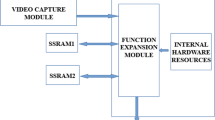Abstract
A high-level Field Programmable Gate Array (FPGA) prototype for a JPEG image encoder has been developed by the Structures, Pointing, and Control Engineering (SPACE) University Research Center (URC). The FPGA prototype uses MathWorks Simulink and Xilinx System Generator for deployment on its Virtex-5 FPGA board. The FPGA module serves as a co-processor of a real-time Ubiquitous Video Conferencing (UVC) software package. The project objective is to: 1) study the high-level synthesis method for FPGA design, and 2) provide the digital signal processing necessary to offload computationally-intensive video processing data from a host computer running the UVC application [1]. The project uses a Xilinx XUPV5-LV110T FPGA Development System. The image compression utilizes the JPEG standard. Each module for the JPEG encoder is designed in Simulink. To reduce computation time on the FPGA due to floating-point Discrete Cosine Transform (DCT) calculations, a table containing DCT cosine product values was computed in Excel, accurate to two decimal digits. These values are shifted 6 bits to the left to maintain accuracy and loaded onto the FPGA. The product of 8-bit YCbCr channel data and tabulated values is accumulated into a register, then scaled and shifted 6 bits to the right to complete the DCT.
Access this chapter
Tax calculation will be finalised at checkout
Purchases are for personal use only
Similar content being viewed by others
References
Structures, propulsion, and control engineering space center, California State University, Los Angeles (2012), http://www.calstatela.edu/orgs/space/
Author information
Authors and Affiliations
Editor information
Editors and Affiliations
Rights and permissions
Copyright information
© 2013 Springer-Verlag Berlin Heidelberg
About this paper
Cite this paper
Nunez, G. et al. (2013). High Level FPGA Modeling of an JPEG Encoder. In: Brisk, P., de Figueiredo Coutinho, J.G., Diniz, P.C. (eds) Reconfigurable Computing: Architectures, Tools and Applications. ARC 2013. Lecture Notes in Computer Science, vol 7806. Springer, Berlin, Heidelberg. https://doi.org/10.1007/978-3-642-36812-7_27
Download citation
DOI: https://doi.org/10.1007/978-3-642-36812-7_27
Publisher Name: Springer, Berlin, Heidelberg
Print ISBN: 978-3-642-36811-0
Online ISBN: 978-3-642-36812-7
eBook Packages: Computer ScienceComputer Science (R0)




